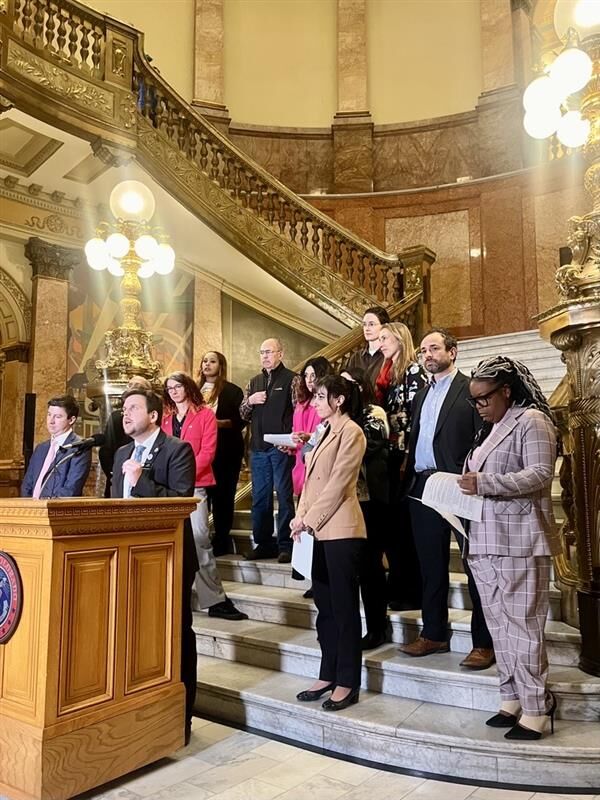Oil and gas industry to push for policy changes under Trump administration
The oil and gas industry sees an opening to reverse “heavy handed mandates” with the incoming Trump administration, arguing that last week’s elections showed that Americans want the widest possible portfolio of energy sources — not “government mandates and restrictions.”
Meanwhile, environmentalists are gearing up for a fight.
In Colorado, oil and gas industry leaders said the state’s stringent regulations would adequately protect public health.
The American Petroleum Institute (API) this week unveiled its five-point policy roadmap, saying it would rebuild America’s energy leadership, protect consumer choice, leverage domestic natural resources, reform the energy permitting system, advance sensible tax policy, and lower costs for energy consumers.
“Our new five-point policy roadmap recognizes that Americans on both sides of the aisle don’t want to be told what kind of car to drive,” said Amanda Eversole, the group’s executive vice president and chief advocacy officer. “That’s why we’re calling on policymakers to repeal heavy handed mandates like the tailpipe rules and the CAPA standards.”
The Trump administration should also deny California’s EPA Clean Air Act waiver that allows it to set its own emissions policies, she said.
API President and CEO Mike Summers said Americans weighed in on energy policy when they elected Trump as the country’s next president.
“Looking at the results of last week’s election, it is clear that energy was on the ballot,” Sommers said. “Whether it was EV mandates in Michigan or fracking in Pennsylvania, voters across the country and on both sides of the aisle sent a clear message to policymakers that they want an all of the above approach to energy, not government mandates and restrictions.”
Sommers noted that exit polling shows that economic stability and inflation, both linked to energy policy, dominated voters’ concerns.
Organizations, including the Natural Resources Defense Council, the Sierra Club and the Environmental Defense Fund, have expressed worries about potential rollbacks of policies aimed at reducing greenhouse gas emissions and promised to fight back.
“Just days after the election, we are already seeing big polluters emboldened by Donald Trump’s agenda to increase costly fossil fuel use and devastate our public health and our environment,” Sierra Club Executive Director Ben Jealous earlier said. “Ramping up coal use would mean higher monthly costs for ratepayers, more deadly pollution in our communities, and more climate chaos, all for the sake of boosting profits for coal executives.”
During the group’s briefing on Tuesday, API’s Eversole reiterated API’s support for repealing the California waiver, saying that would put the decisions about car emissions back in the hands of the federal government as a unified nationwide standard.
Congress has preempted states from adopting their own emissions standards for cars but allowed California to apply to the EPA for a waiver. Congress also allowed other states to adopt California’s vehicle emissions standards under certain conditions. As of this year, 17 states, plus the District of Columbia, have adopted some of California’s standards.
In addition to repealing California’s waiver, Eversole urged the Trump administration to reverse the Department of Energy’s pause on liquified natural gas export permitting.
The January move by the Biden administration aligned with environmentalists who fear an increase in exports — in the form of liquefied natural gas, or LNG — would lock in what they described as catastrophic planet-warming emissions.
Several states, including Alaska, Louisiana, Texas, West Virginia and Wyoming, had challenged the move back in March. The states claimed the administration violated federal law by banning export of LNG to countries without free trade agreements with the U.S.
A preliminary injunction against the Biden administration’s delay was issued in July by U.S. District Judge James Cain, Jr., and that remains in effect. Cain said the administration’s actions caused a loss of revenues and deferred investments in LNG projects due to the Biden administration’s actions.
The Biden White House disagreed with the injunction.
“We remain committed to informing our decisions with the best available economic and environmental analysis, underpinned by sound science,” White House spokesperson Angelo Fernández Hernández said in an email to The Associated Press.
The API said the incoming administration should also tackle what it calls the weakest offshore program in history.
“Issuing a new five-year offshore leasing program and holding regular lease sales should be a key priority to encourage long-term investments,” said Eversole. “It’s also critical that the new administration repeals restrictive onshore leasing rules and work with Congress to repeal EPAs methane fee, which was just finalized today.”
The EPA promulgated a final rule implementing a methane emissions fee on Wednesday, marking the first federal fee of its kind targeting methane emissions from the oil and gas industry. The initiative is part of the Methane Emissions Reduction Program established under the Inflation Reduction Act of 2022.
The fee applies to petroleum and natural gas facilities emitting more than 25,000 metric tons of carbon dioxide equivalent per year. The fee is set at $900 per metric ton of methane emissions for 2024. This amount will increase to $1,200 per metric ton in 2025 and $1,500 per metric ton for 2026 and subsequent years, according to the EPA.
Environmental advocates lauded it as a significant step toward reducing greenhouse gas emissions.
Conversely, industry groups, such as the American Petroleum Institute, labeled the fee as a punitive measure that could undermine the competitiveness of the U.S. oil and gas industry.
Asked about President-elect Donald Trump’s view on the Paris Climate Accords, which Trump withdrew from in his first term, Sommers said, “The United States leads the world in the production of oil and gas and the reduction of emissions. We support the ambition of the Paris Climate Accords, but regardless of whether we stay in or out, our focus will be on the dual challenge of emissions reduction and on meeting the world’s energy needs.”
Addressing the EPA’s new vehicle exhaust rule that mandates a 49% reduction in vehicle emissions by 2032 compared to 2026 levels and requires that, by 2032, 56% of new vehicle sales will need to be EVs, Sommers said, “American consumers continues to vote with their wallet and they’re voting at the ballot box to say that this is not a mandate that they want in place.”
“Americans deserve choices in the kind of car that suits their needs, and unfortunately, these heavy-handed regulations from the federal government don’t meet the needs of most American consumers,” Sommers added. “We know that EVs make sense for some consumers, but they don’t make sense for all consumers.”
Environmentalists said they are preparing for a protracted battle over any efforts to roll back policies they support.
The Center for Biological Diversity vowed an “all-out effort to protect the climate, wildlife and wild places from Trump’s destructive environmental policies.”
“Trump 2.0 is going to get twice the fight from the protectors of our planet, wildlife and basic human rights,” said Kierán Suckling, the group’s executive director. “We’ve battled Trump from the border wall to the Arctic Wildlife Refuge, and in many cases we’ve won. This country’s bedrock environmental laws stand strong. We’re more prepared than ever to block the disastrous Trump policies we know are coming.”
Industry representatives in Colorado strongly disagree with those worries, arguing that Colorado’s stringent regulations on the industry would protect public health.
Dan Haley, president and CEO of the Colorado Oil and Gas Association, said as Americans face elevated energy prices, policy changes would enable domestic energy producers to “responsibly develop these vital resources in Colorado, helping maintain affordable energy for all.” He said all development, whether that is on federal or private land, must comply with Colorado’s “robust environmental and permitting regulations.”
“Despite Colorado operators producing some of the cleanest molecules of energy in the world under stringent environmental protections, federal permit processing and leasing significantly slowed during the Biden administration, with only one lease auction held in Colorado,” Haley told The Denver Gazette.
“Given our state’s comprehensive safeguards and proven track record of responsible development, supporting oil and natural gas production in Colorado — including on federal lands — represents a clear opportunity to meet our nation’s energy needs while maintaining high environmental standards.”
“Colorado’s oil and gas industry understands the importance of responsible energy production and operates under some of the most stringent regulatory standards in the world,” API Colorado Director Kait Schwartz told The Denver Gazette. “While we support balanced federal energy policies, we will continue to lead by example by maintaining our commitment to responsible energy production.”
The Associated Press contributed to this report.











